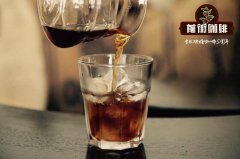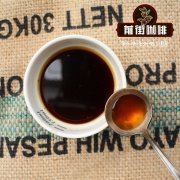What is the certification of authentic Jamaican Blue Mountain Coffee? The flavor and taste of Blue Mountain Coffee? Front street coffee

Professional coffee knowledge exchange more coffee bean information please follow the coffee workshop (Wechat official account cafe_style)
What is the certification of authentic Jamaican Blue Mountain Coffee? The flavor and taste of Blue Mountain Coffee? The price of the authentic Jamaican Blue Mountain Coffee on the front street?
Front Street Jamaica Blue Mountain Coffee beans authentic BlueMount Blue Mountain NO.1 Coffee 100g roasted
Blue Mountain Coffee is the best coffee in the world. The Blue Mountains are located in eastern Jamaica, hence the name because the mountain is surrounded by the Caribbean Sea. On clear days, the sun shines directly on the blue sea, and the peaks reflect the bright blue light of the sea. The highest peak of the Blue Mountains, which is 2256 meters above sea level, is the highest peak in the Caribbean and a famous tourist attraction. Located in the coffee belt, with fertile volcanic soil, fresh air, no pollution, humid climate, foggy and rainy all the year round, this climate has created the world-famous Jamaican Blue Mountain Coffee as well as the highest price in the world. Blue Mountain Coffee has the characteristics of all good coffee, not only full-bodied and mellow, but also because of the perfect combination of sweet, sour and bitter coffee, it has no bitter taste at all, only a moderate and perfect sour taste. It is generally drunk on a single product, but because the output is very small and the price is extremely expensive, it is generally made with coffee with a similar taste on the market.
Market share: Jamaican Blue Mountain Coffee has always been a divine presence in China, and almost every coffee shop must claim to have it. It's just that not many people really use blue mountain beans. According to Jamaica Coffee Bureau export statistics as of 2004, 85% of the limited Blue Mountain coffee bean quotas were exported to Japan, 5% to the United States, 5% to Europe and 5% to other countries. However, China accounts for 15% of the global consumption and distribution of authentic Jamaican Blue Mountain coffee, according to the International Coffee Association. This is due to the fact that some shares of Jamaican Blue Mountain coffee in Japan, Australia and Europe are exported to Taiwan through direct subsidiaries.
The "secret" of why Blue Mountain coffee tastes pure: their coffee trees are all on rugged hillsides, and the picking process is so difficult that non-local skilled women are simply unable to do it. It is very important to choose the right ripe coffee beans when picking. Immaturity or ripeness will affect the quality of the coffee. The picked coffee beans are shelled on the same day, and then let them ferment for 18 hours. After that, the coffee beans were cleaned and screened. The subsequent process is to dry, which must be carried out on the cement floor or on a thick blanket until the humidity of the coffee beans drops to 12% 14%. And then store it in a special warehouse. Take it out and roast when needed, then grind it into powder. These procedures must be strictly mastered, otherwise, the quality of coffee will be affected.
There are three grades of coffee in the Blue Mountains of Jamaica:
Blue Mountain Coffee (Blue Mountain Coffee)
Alpine coffee (Jamaica High Mountasin Supreme Coffee Beans)
Jamaica Coffee (Jamaica Prime Coffee Beans)
Among them, Blue Mountain Coffee and Alpine Coffee are each divided into two grades. In terms of quality, the order from top to bottom is: blue Mountain 1, Blue Mountain 2, Gaoshan 1, Gaoshan 2, Jamaican Coffee. Coffee grown between 457m and 1524 m above sea level is usually called Blue Mountain Coffee. Coffee grown between 274m and 457m above sea level is often called Jamaica Prime Coffee Beans, and the price of blue mountain coffee is several times higher than that of alpine coffee.
Legal processing plants: some of the blue mountain coffee beans that enter Taiwan are raw beans, that is, unprocessed coffee beans, while others are cooked beans processed by four local legal processing plants in the blue mountains of Jamaica. However, according to the Coffee Association, the price difference between raw and cooked beans of Jamaican Blue Mountain Coffee is nearly ten times. Because Jamaica Blue Mountain coffee beans not only pay attention to origin origin, but also pay great attention to processing methods. If imported raw beans, on the one hand, they can not enjoy the perfect flavor of Jamaican Blue Mountain Coffee, on the other hand, they are easy to be mixed with other coffee beans by imported traders, the intermediate process is not supervised, or the storage environment is inappropriate, resulting in the death of top Blue Mountain Coffee.
Certificate of origin: Jamaican Blue Mountain coffee beans exported in Jamaica must be inspected and certified by the coffee shop before they can be allowed to be exported. At the same time, the Jamaican Blue Mountain coffee trademark registered by the coffee bureau in more than 20 countries around the world must be used to truly be called authentic Jamaican blue mountain coffee beans. Among them, the Jamaica Coffee Bureau stipulates that the Jamaican Blue Mountain Coffee must be grown in the legal coffee area in order to be called the real Jamaican Blue Mountain Coffee. It is authorized to use the coffee bureau registered trademark: Blue Mountain Coffee.
Planting conditions: the legal planting area of Jamaican Blue Mountain Coffee is on the eastern side of the island of Jamaica, with a total altitude of 7402 feet. Only at an altitude of 3000,000 feet can you grow balanced and slightly acidic Jamaican Blue Mountain Coffee. Only in this altitude Blue Mountain area, the Jamaican Blue Mountain Coffee is considered to be 100% Jamaica Blue Mountain Coffee. The coffee grown below 3000 feet above sea level is alpine coffee, which is licensed to use High Mountain Coffee. The total amount of alpine coffee grown is five times that of Jamaican Blue Mountain coffee, and most private estates grow alpine coffee for export and domestic sale as a tourism specialty. As for the blue mountain area above 5000 feet above sea level, the jungle is dense and is not suitable for any crop.
Quality check: like red wine produced by famous houses, Jamaican Blue Mountain Coffee is also born in manors. the processing level of famous houses is much better than that of other processing plants, which is called legal manor. In the Jamaican Coffee Industry Regulation, the Jamaican Coffee Authority authorizes several large estates to centrally process coffee fruits, export Jamaican Blue Mountain coffee beans and use the Jamaican Blue Mountain Coffee trademark. to maintain the reputation and quality of Jamaican Blue Mountain Coffee.
Aroma / flavor flavor: cereal, alpine oolong tea, jasmine, chamomile, flowers, brown sugar, honey
Acidity: very fresh, clean, pink, citrus, green malic acid, mild to moderate acidity
The complexity of complex is similar to that of other: smooth and gentle, balanced and soft, delicate and delicate, mellow, floral fragrance and long rhyme, and the remaining rhyme is not converted to sweet until the middle part.
Qianjie recommended cooking:
Filter cup: KONO filter cup
Water temperature: 88 degrees
Degree of grinding: small Fuji degree of grinding 4
Cooking method: the ratio of water to flour is 1:14, 17g powder, 25g water for the first time, steaming for 30s, and 238g water for the second time. The extraction time is about 2:30 seconds.
Analysis: there are not many ribs at the bottom of the Kono cup, and the filter paper clings to the filter cup to achieve the purpose of limiting air flow, which can make water and coffee powder have longer contact soaking time in the filter cup and ensure the extraction time and extraction rate of rough grinding. In this way, the coffee powder can be fully extracted, enhance the mellow taste and make the taste more concentrated.
Flavor: well balanced, clean, thick and solid on the palate, with a long dark chocolate finish.
Important Notice :
前街咖啡 FrontStreet Coffee has moved to new addredd:
FrontStreet Coffee Address: 315,Donghua East Road,GuangZhou
Tel:020 38364473
- Prev

Is it true that Jamaica Mavis Bank Blue Mountain Coffee NO.1? A cup of authentic Blue Mountain Coffee in Front Street
Professional coffee knowledge exchange more coffee bean information please follow the coffee workshop (Wechat official account cafe_style) Jamaica Mavis Bank Blue Mountain Coffee NO.1 is it true? How much is a cup of authentic Blue Mountain coffee in front of the street? Front Street Jamaica Blue Mountain Coffee beans authentic BlueMount Blue Mountain NO.1 Coffee 100g roasted Jamaica Mavis Bank Blue Mountain NO.1 beans, Mav
- Next

Where is the Rwandan coffee? introduction to the flavor of Rwandan coffee? what kind of coffee do you have in Rwanda?
Professional coffee knowledge exchange more coffee bean information please follow Coffee Workshop (Wechat official account cafe_style) Rwanda is a landlocked country located in east-central Africa. It is bordered by Tanzania to the east, Burundi to the south, the Democratic Republic of the Congo to the west and northwest, and Uganda to the north. Rwanda is one of the smallest countries in Africa.
Related
- Detailed explanation of Jadeite planting Land in Panamanian Jadeite Manor introduction to the grading system of Jadeite competitive bidding, Red bid, Green bid and Rose Summer
- Story of Coffee planting in Brenka region of Costa Rica Stonehenge Manor anaerobic heavy honey treatment of flavor mouth
- What's on the barrel of Blue Mountain Coffee beans?
- Can American coffee also pull flowers? How to use hot American style to pull out a good-looking pattern?
- Can you make a cold extract with coffee beans? What is the right proportion for cold-extracted coffee formula?
- Indonesian PWN Gold Mandrine Coffee Origin Features Flavor How to Chong? Mandolin coffee is American.
- A brief introduction to the flavor characteristics of Brazilian yellow bourbon coffee beans
- What is the effect of different water quality on the flavor of cold-extracted coffee? What kind of water is best for brewing coffee?
- Why do you think of Rose Summer whenever you mention Panamanian coffee?
- Introduction to the characteristics of authentic blue mountain coffee bean producing areas? What is the CIB Coffee Authority in Jamaica?

